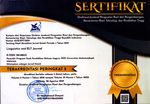Exploring Lived Narratives: Indonesian SEA Teacher Awardees' English Teaching Challenges in the Philippines
Abstract
This study investigates the experiences of Indonesian pre-service teachers majoring in English education who participated in the SEA Teacher program, specifically focusing on those assigned to teach English in the Philippines. The primary objective was to identify the challenges these Indonesian SEA Teacher awardees encountered and the strategies they employed to mitigate these challenges, considering the differing statuses of English in Indonesia (as an EFL context) and the Philippines (as an ESL context). The research utilized a g inquiry approach, complemented by semi-structured interviews, to gather qualitative data. The participants comprised four pre-service teachers who successfully completed the SEA Teacher international teaching practice program in 2023, which spanned one month. The findings reveal several challenges faced by the participants, including issues related to self-confidence, language barriers, the educational system, and the availability of facilities. The study underscores the importance of thorough preparation, adaptability, and mentor support in overcoming these obstacles and enhancing teaching practices.
Keywords
Full Text:
PDFReferences
M. B. Ulla, “Pre-service teacher training programs in the Philippines: The student-teachers practicum teaching experience,” EFL Journal, vol. 1, no. 3, pp. 235–250, 2016.
I. Chasanah and S. Sumardi, “A retrospective narrative study of pre-service teachers’ language barrier experiences in international teaching practicum,” VELES Voices of English Language Education Society, vol. 6, no. 1, pp. 271–282, Apr. 2022.
A. P. Perwitasari and H. Sundari, “Exploring the voices of Indonesian Non-Native English-speaking teachers teaching abroad,” Deiksis, vol. 14, no. 1, pp. 28–38, 2022.
F. Aziez, “Persepsi mahasiswa terhadap Native English Teachers (NET) dalam mata kuliah speaking 1 dan writing 1,” Tarbawi: Jurnal Pendidikan Islam, vol. 12, no. 2, 2015.
S. Rahmawati and F. Kurniawan, “Voicing the unvoiced Indonesian SEA Teacher teaching in the Philippines: A phenomenological study,” International Journal of Innovation, Creativity and Change, vol. 12, no. 6, pp. 45–55, 2020.
SEAMEO, “SEA Teacher Program.” [Online]. Available: https://www.seameo.org/Main_programme/430
S. Ozaki, “Learning English as an international lingua franca in a semi-English-speaking country: The Philippines,” Asian EFL Journal, vol. 53, no. 3, pp. 51–60, 2011.
G. Alrajafi, “The use of English in Indonesia: Status and influence,” SIGEH ELT: Journal of Literature and Linguistics, vol. 1, no. 1, pp. 1–10, Mar. 2021.
K. Nakahara, “The socio-linguistics situation in the Philippines and the future of English and Filipino in the country,” Nature-people-society: Science and the Humanities, vol. 40, pp. 33–49, 2006.
F. Alfarisy, “Kebijakan pembelajaran Bahasa Inggris di Indonesia dalam perspektif pembentukan warga dunia dengan kompetensi antarbudaya,” Jurnal Ilmiah Profesi Pendidikan, vol. 6, no. 3, pp. 303–313, Nov. 2021.
D. Pajarwati, H. Mardiah, R. P. Harahap, R. O. Siagian, and M. T. Ihsan, “Curriculum reform in Indonesia: English education toward the global competitiveness,” ETDC: Indonesian Journal of Research and Educational Review, vol. 1, no. 1, pp. 28–38, 2021.
M. K. Kabilan, J. M. Ramdani, A. A. Mydin, and R. Junaedi, “International teaching practicum: Challenges faced by pre-service EFL teachers in ESL settings,” LEARN Journal: Language Education and Acquisition Research Network, vol. 13, no. 1, pp. 114–126, 2020.
Y. De La Cruz and M. Paula, “The effects of lack of vocabulary on students’ confidence,” (Bachelor’s thesis, La Libertad: Universidad Estatal Península de Santa Elena, 2023), 2023.
A. M. Songbatumis, “Challenges in teaching English faced by English teachers at MTsN Taliwang, Indonesia,” Journal of Foreign Language Teaching and Learning, vol. 2, no. 2, pp. 54–67, 2017.
F. Aziez and F. Aziez, “The vocabulary input of Indonesia’s English textbooks and national examination texts for junior and senior high schools,” TESOL International Journal, vol. 13, no. 3, pp. 66–67, 2018.
Y. Kobari, “Lessons to be learned from the Philippines: English language policies and the booming ESL industry in a multilingual society viewed from a Japanese perspective,” (Doctoral dissertation, Kansai Gaidai University), 2019.
M. R. R. Aranda, “Learning challenges in the new senior high school English curriculum in the Philippines,” International Journal of Learning, Teaching and Educational Research, vol. 21, no. 11, pp. 315–333, 2022.
Y. Iwai, “The effects of metacognitive reading Strategies: pedagogical implications for EFL/ESL teachers,” Reading Matrix: An International Online Journal, vol. 11, no. 2, pp. 150–159, 2011.
Y. H. Ying, W. E. W. Siang, and M. Mohamad, “The challenges of learning English skills and the integration of social media and video conferencing tools to help ESL learners coping with the challenges during COVID-19 pandemic: A literature review,” Creat Educ, vol. 12, no. 07, pp. 1503–1516, 2021, doi: 10.4236/ce.2021.127115.
P. Domingo, “Triumphs and struggles in teaching the English language,” International Journal of Studies in Education and Science (IJSES), vol. 1, no. 1, pp. 59–79, 2020.
R. Sampelolo, M. Tandikombong, N. P. Pongsapan, and H. Lura, “A study of speaking common university learner barriers in Indonesia context,” Klasikal: Journal of Education, Language Teaching and Science, vol. 3, no. 3, pp. 127–131, 2021.
A. Amiruddin, “English speaking’s barriers of foreign learners,” JRTI (Jurnal Riset Tindakan Indonesia), vol. 7, no. 3, p. 495, Aug. 2022.
A. Yulia, “Indonesian pre-service teachers’ major problems in teaching English at primary schools, Thailand,” in Bogor English Student and Teacher (BEST) Conference, 2021, pp. 40–47.
C. U. Musa and A. Ariyanti, “SEA-Teacher students’ perspective: Challenges teaching English overseas in the Philippines,” Borneo Educational Journal (Borju), vol. 2, no. 1, pp. 14–19, Feb. 2020.
J. W. Creswell, Educational research: Planning, conducting, and evaluating quantitative and qualitative research, 4th ed. Boston: Pearson Education, 2012.
DOI: https://doi.org/10.31764/leltj.v12i2.27712
Refbacks
- There are currently no refbacks.
Copyright (c) 2024 Dika Setianti, Feisal Aziez, Santhy Hawanti

This work is licensed under a Creative Commons Attribution-ShareAlike 4.0 International License.
_____________________________________________________
Linguistics and ELT Journal
p-ISSN 2339-2940 | e-ISSN 2614-8633

LELTJ is licensed under a Creative Commons Attribution-ShareAlike 4.0 International License.
_____________________________________________________
LELTJ is abstracting & indexing in the following databases:
_____________________________________________________
LELTJ Editorial Office:













